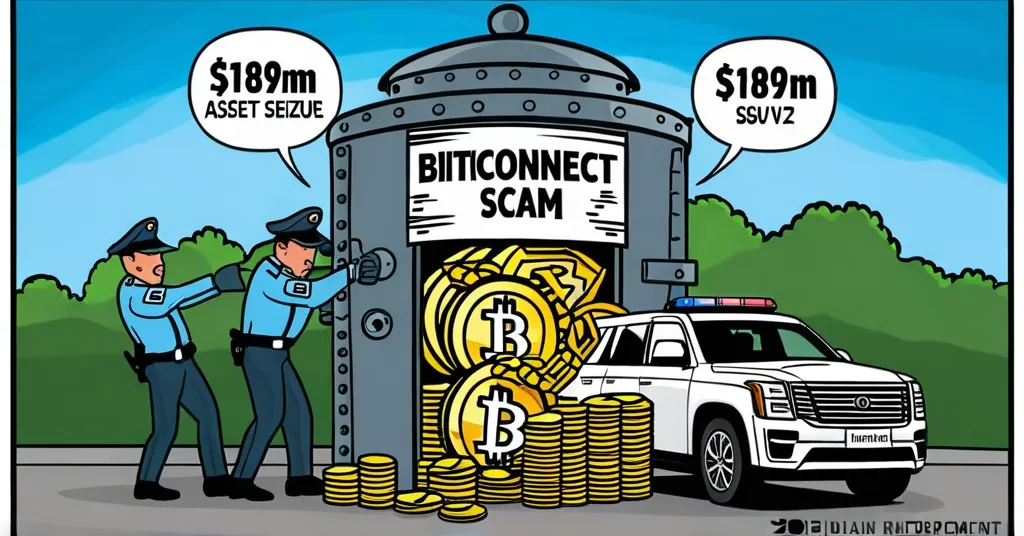Indian Authorities Seize $189M in Assets from Bitconnect Crypto Scam

Indian Authorities Seize $189M in Bitconnect Investment Scam
Indian authorities have cracked down on the notorious Bitconnect cryptocurrency scam, seizing assets valued at approximately $189 million. This bold move underscores the global effort to combat cryptocurrency fraud and brings hope to investors who were duped by promises of astronomical returns through a fictitious trading bot.
- Bitconnect promised up to 40% monthly returns through a non-existent trading bot.
- Indian authorities seized $189M in assets, including cryptocurrencies and physical items.
- Legal actions continue in India and the US, with some restitution for victims.
The Bitconnect scam, which duped investors worldwide, operated from November 2016 to January 2018. The platform lured unsuspecting investors with the promise of up to 40% monthly returns, or a staggering 3700% annually, through what they called a “volatility software trading bot.” For those not in the know, a Ponzi scheme is a type of fraud where returns are paid to earlier investors using the investments of more recent investors, and in this case, Bitconnect was the poster child. But as the old saying goes, if something sounds too good to be true, it probably is. The Indian authorities revealed the harsh truth: “The platform told investors that, among other things, they would use a volatility software trading bot, which they claimed will help the investors generate returns, which can go as high as 40% every month.” However, “The Indian authorities claimed that the platform did not have a trading bot, but they siphoned investor funds and moved them to digital wallets in their control,” exposing Bitconnect for the scam it was.
The Enforcement Department, under the Prevention of Money Laundering Act (PMLA), seized a haul including various cryptocurrencies, physical cash, an SUV, and digital devices, totaling Rs. 1,646 crore ($189 million). This seizure is a testament to the scale of the fraud and the intricate network of promoters who lured investors into the scheme. The Indian authorities are relentless in their pursuit of justice, actively chasing down suspects like Satish Kumbhani, the founder of Bitconnect, and Glenn Arcaro, a US promoter, both indicted for their roles in the scam.
Parallel legal efforts in the United States have also seen some progress, with over $17 million allocated for restitution to approximately 800 victims across 40 countries. Yet, the journey to recovery remains challenging. An expert remarked, “This scheme underscores the need to be watchful in the crypto sector. Unlike the traditional finance industry where firms can make efforts to recover stolen funds, it is hard to recover stolen funds in the crypto industry.” The decentralized nature of cryptocurrencies, while a boon for privacy and freedom, also poses significant hurdles in tracing and seizing stolen assets. The challenges of recovering stolen funds in cryptocurrency Ponzi schemes are well-documented and complex.
As enthusiasts of Bitcoin and blockchain technology, we champion the ideals of decentralization and effective accelerationism (e/acc). Bitcoin remains the gold standard, but we must also recognize the roles of altcoins and other blockchains in driving innovation and filling unique niches. However, this scam is a stark reminder that the very features that make cryptocurrencies revolutionary can also be exploited by scammers. It’s a bit like inviting a wolf to the dinner table and hoping it doesn’t eat the chicken. Legal actions against such scams are crucial to protect investors.
The Bitconnect saga teaches us valuable lessons. It’s a call to arms for increased vigilance and due diligence within the crypto community. While we celebrate the potential of blockchain technology, we must also guard against its dark sides. It’s not just about the thrill of the financial revolution; it’s about ensuring that the revolution doesn’t leave investors in the dust. Cryptocurrency fraud prevention strategies are more important than ever.
Key Questions and Takeaways
What was the total value of assets seized by Indian authorities in the Bitconnect scam?
Approximately $189 million in cryptocurrency, along with physical cash, an SUV, and digital devices.What was the period during which Bitconnect operated its scam?
From November 2016 to January 2018.What was the fraudulent mechanism used by Bitconnect to attract investors?
Bitconnect promised investors high returns through a fictitious volatility software trading bot, claiming up to 40% monthly returns.How are the victims of the Bitconnect scam being compensated in the United States?
Over $17 million has been allocated for restitution to approximately 800 victims across 40 countries.Who are the key individuals indicted in relation to the Bitconnect scam?
Satish Kumbhani, the founder of Bitconnect, and Glenn Arcaro, a US promoter, have been indicted for their roles in the scam.What challenges does the cryptocurrency sector face in recovering stolen funds?
Unlike traditional finance, recovering stolen funds in the crypto industry is difficult due to its decentralized nature and the ease of moving assets across borders and into digital wallets.



